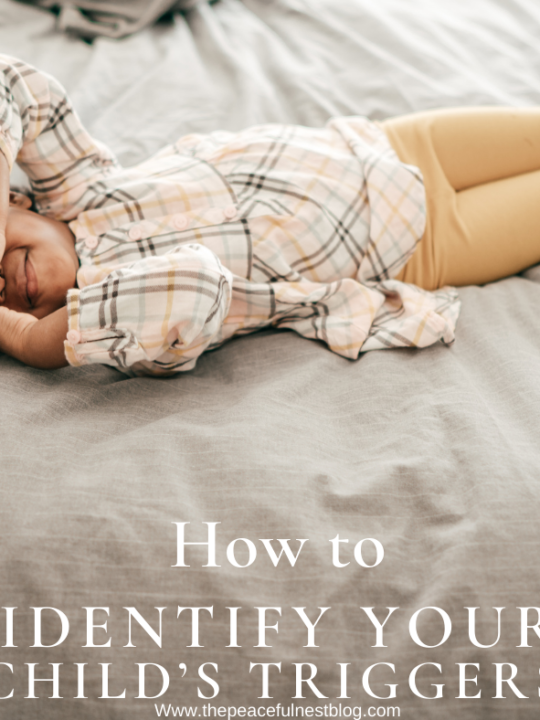
Parenting can be a difficult task, and it can be even more complicated when trying to identify triggers for your child. Many parents spend hours trying to decode what makes their children act the way they do. But, unfortunately, triggers can have a significant impact on a child’s behavior.
In this blog post, we will discuss how to identify triggers and how they can affect your child.
We will also provide some tips on how to tell if something is triggering your child.
I have an older daughter who is highly sensitive. Sometimes her meltdowns seemed nonsensical, especially to a bystander who may claim, “oh, she’s just being bossy, or she’s just being dramatic.” But the truth was, she was feeling her emotions at a stronger capacity than many people and needed to learn how to cope with them.
Over the last several years, I have learned what can bother her and strategies that can help calm her down, but first, I needed to figure out her triggers. If you have a highly sensitive child, it can be helpful to figure out what triggers their meltdowns. However, it can also be beneficial for all children in general.
Figuring out what triggers your child can help you be more prepared when they do have a meltdown. It can also help you understand your child’s triggers better. If you know what triggers your child, you can avoid those triggers or be more prepared for them.
So, how do you figure out what triggers your child? Here are some tips:
-Talk to your child’s pediatrician: Your child’s doctor can offer some insight on what may trigger your child. They may also be able to provide some suggestions on dealing with triggers.
-Keep a journal: For a week or two, keep track of everything that happens before and during a meltdown. This will help you start to see patterns emerge.
-Ask your child: Once they are calm, you can ask your child what happened and what made them upset.
-Pay attention to triggers: There are some common triggers for children, such as changes in routine, hunger, fatigue, overstimulation, etc. By paying attention to when your child has a meltdown, you may be able to start to see patterns emerge.
How triggers can affect your child
Now that you know how to identify triggers, it is crucial to understand how they affect your child. For example, triggers can cause a child to become agitated or anxious They can also lead to meltdowns, which can be very distressing for both the child and the parent.
If you are concerned about how triggers may be affecting your child, it is essential to talk to their pediatrician. They will be able to offer guidance and support.
What are some common triggers for children?
There are many different triggers for children, but some are more common than others. Here are some of the most common triggers for children:
-Changes in routine: Children thrive on routine. When there is a change in their routine, it can trigger them.
-Hunger: If a child is hungry, it can trigger them. It is vital to ensure that your child has regular meals and snacks throughout the day.
-Fatigue: If a child is tired, it can affect them. It is important to make sure your child gets enough sleep at night.
-Overstimulation: If a child is overloaded with sensory input, it can also affect them. This can happen if there are too many people around or too much noise.
What are some trigger identification strategies:
Now that you know how triggers can affect your child and some common triggers, you may wonder why it is so important to identify triggers. There are a few reasons why it is essential to know what triggers your child:
-It can help you avoid triggers: If you know what triggers your child, you can try to avoid them. This can help prevent meltdowns from happening in the first place.
-It can help you be more prepared: If you know what triggers your child, you can be more prepared for when they have a meltdown. This can help reduce the stress for both you and your child.
-It can help you understand your child better: If you know what triggers your child, you may be able to understand them better. This can help you build a stronger relationship with your child.
Identify triggers strategies:
-Talk to your child’s pediatrician
-Keep a journal
-Ask your child
-Pay attention to triggers
Once you have identified triggers, it is beneficial to avoid them. This can be not easy, but it is vital to keep your child calm. If you know what triggers your child, you can be more prepared for them.
In conclusion, parenting can be a difficult task, and it can be even more difficult when you are trying to figure out what triggers your child. Many parents spend hours trying to decode what makes their children act the way they do. This is often because triggers can considerably impact a child’s behavior.
If you have any questions or concerns about triggers, please feel free to reach out to us. We are always happy to help!
The 14 Days of Peaceful Parenting challenge is for mommas who want to create a peaceful home for their family and themselves but just aren’t sure where to start!
Each day of the challenge you will receive an email with a short challenge you can do for the day, a link to a new post with more in depth look at that days topic, and later this week you can join me in the From Chaos to Calm mommy group for a FB live to talk about that days challenge! Do you want in on this challenge?
You can sign up below! ![]() >>>>
>>>>
https://crafty-creator-4532.ck.page/96bfbcc530
If you are new to the Peaceful Nest Blog, welcome!
Be sure to read my top posts on parenting:
- Why Consistent Parenting Matters
- 12 Habits of Immensely Peaceful Moms
- 63 Mom Hacks That Are Pure Genius
Don’t forget to follow The Peaceful Nest on Facebook and Instagram!
And remember, sharing is caring! Share this post on Pinterest below:

Hi there, I’m Jenna! I am a devoted mommy and wife. As well as an advocate for children and creating a peaceful atmosphere for those we love. I co-wrote Faith Actually: Living Life After Tragedy with my husband. I have my Bachelor’s Degree in Biblical Studies and currently working toward my Master’s in Positive Psychology. My number one desire is to create a peaceful home life for my family. My second desire is to share with you the tips I learn along the way!


